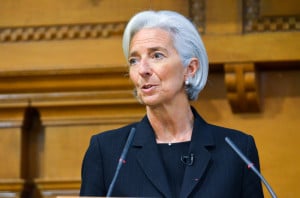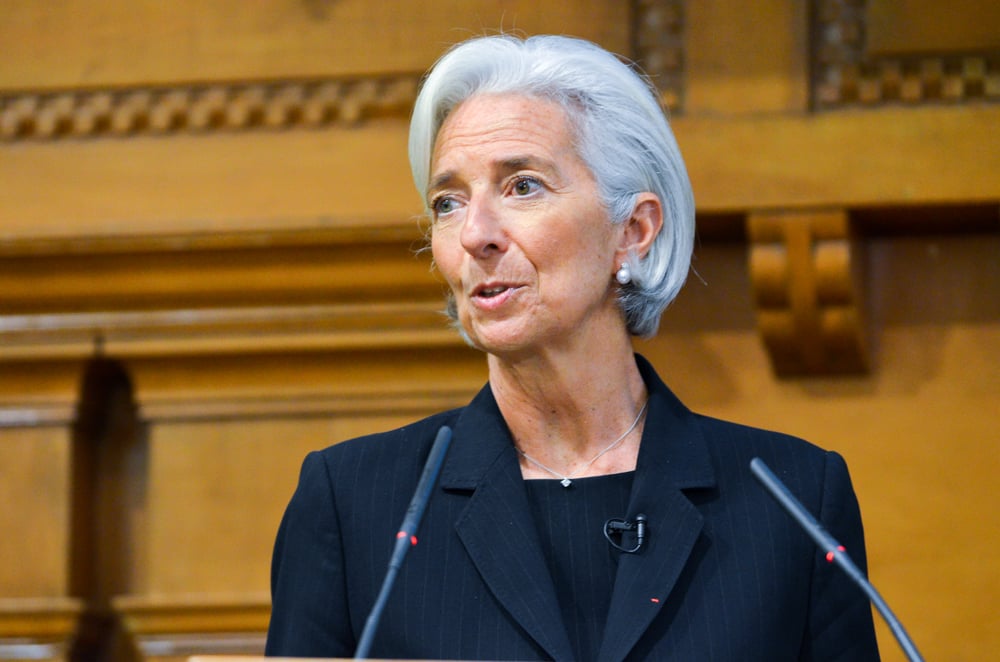
Christine Lagarde, managing director of the International Monetary Fund (IMF), addressed a packed Bechtel Conference Room in Encina Hall on Tuesday, in a talk that focused on the current state of the world economy and global innovation and interconnections.
Lagarde had recently flown in from the G-20 summit in Sydney, Australia, during which the financial leaders of the world’s 20 largest economies had agreed to complete core financial reforms in order to mitigate the risk of another global financial crisis.
Lagarde herself expressed ambivalence about the current global economic performance.
“While unemployment and public and private debt is still too high, and global growth is still too low, we certainly see some economic momentum in the works, with global economic growth of 3.75 percent this year, rising to four percent next year,” she said.
However, this growth, largely due to positive advancements in the United States economy, has led to the tapering of quantitative easing, the Federal Reserve’s unconventional asset purchasing scheme.
“For emerging markets, […] a rising tide came with more choppy waves,” she said, pointing to the fact that weakening economies along with asset-purchase tapering prompted capital flight from emerging markets, generating market volatility and currency variations.
Lagarde also touched upon Stanford’s role in promoting technological learning and spurring innovation, asserting that students need to recognize the role that they play in driving progress.
“If the previous [economic] revolutions were about using machines for brawn, this one is about using machines for brains,” she said, pointing out that science fiction is rapidly becoming “science fact.”
Lagarde noted that despite unprecedented levels of innovation, technology has led to growing concerns about rising inequality.
“The bottom half of the world’s population owns the same as the richest 85 people in the world,” Lagarde, citing figures from Oxfam International.
She suggested that Stanford is, and should continue to be, at the forefront of the fight against inequality.
“I know that these concerns resonate strongly at this university, which was founded—to use the words of Jane Stanford—with a ‘spirit of equality,’” she said.
In Lagarde’s mind, alleviating this inequality starts with education.
“Fundamentally, we need to change what people learn, how people learn, when people learn and even why people learn,” she said. “We must get beyond the traditional model of students sitting passively in classrooms.”
In an interview with The Daily after her talk, she urged Stanford to help democratize the “bridge” that education provides.
“Given where it is located and given the density of innovation in Stanford’s ecosystem, I am sure that it will use some of the tools, be it e-learning or e-teaching, to propagate the learning, research and work that is being done here at Stanford,” Lagarde said.
According to Lagarde, the private sector should communicate more openly about what its scenarios for the future are, and what its strategies will be, in order to help educational institutions actually adapt to that market.
“It is only through that dialogue that we can ensure that education really is a bridge between today’s and tomorrow’s economy,” she said. “This is a great test of our time, and I know that the Stanford community is intricately linked to the developments that will shape out future.”
The event was co-sponsored by the Freeman Spogli Institute for International Studies and the Stanford Institute for Economic Policy Research.
Contact Felix Boyeaux at fboyeaux ‘at’ stanford ‘dot’ edu.
